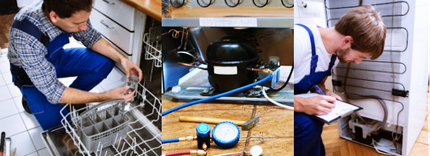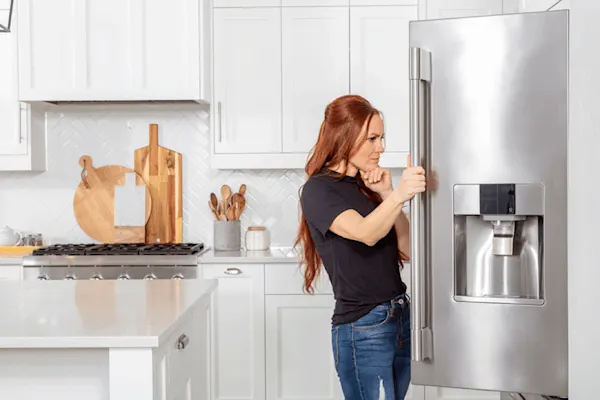The Ultimate Guide to Comprehending Appliance Repair Service in the house
When your fridge quits cooling down or your oven refuses to heat, it can really feel overwhelming. Comprehending appliance repair at home can save you time and cash. You'll learn to identify signs, utilize essential devices, and follow an organized troubleshooting process. However before you start, there are vital security precautions you need to think about. What are one of the most typical issues, and exactly how can you fix them? Let's discover the basics.
Common Device Issues and Their Signs and symptoms
When your devices begin breaking down, it's necessary to identify the indications at an early stage. Disregarding them can result in larger issues and expensive repairs. As an example, if your refrigerator isn't cooling correctly, you may discover warm places or condensation creating. This might suggest a stopping working compressor or a blocked vent.Your dishwasher might show problems through dirty dishes or uncommon sounds throughout cycles. If you listen to grinding or clanking, it's time to investigate.A washing equipment that won't rotate or drain can leave you with soaked washing, suggesting a clogged drain or a malfunctioning pump.Lastly, if your stove's temperature level appears off or it takes for life to preheat, you might be taking care of a damaged thermostat. By remaining sharp to these symptoms, you can address concerns before they escalate right into major repairs.
Necessary Devices for Appliance Repair Work
When you're taking on home appliance fixings in your home, having the right devices is important. Basic hand devices like screwdrivers and pliers will certainly help you dismantle and deal with numerous devices, while electric testing tools assure you're working safely with wiring. Let's review what you require to start on your repair journey.
Fundamental Hand Devices
Having the right tools is essential for efficient device repair in your home. Start with a trustworthy screwdriver set, consisting of both flathead and Phillips kinds, as screws prevail in home appliance assembly. Pliers are likewise vital; they aid with gripping, turning, and cutting cords or tiny components. A pair of needle-nose pliers can get to difficult situations easily. You'll need a great adjustable wrench for tightening or loosening nuts and screws. An energy blade is useful for reducing with packaging or insulation. Do not neglect a sturdy workbench or surface area to safely arrange your devices and parts. With these fundamental hand tools, you'll be well-prepared to deal with most appliance repair services that come your way.
Electric Screening Gadgets
Together with fundamental hand devices, electrical screening gadgets play a vital role in appliance fixing. These tools aid you diagnose electrical problems and guarantee devices work safely. A multimeter is crucial; it measures voltage, existing, and resistance, allowing you to determine problems swiftly. A non-contact voltage tester is an additional must-have, allowing you spot live cords without making direct get in touch with, boosting your security. Secure meters are excellent for determining present circulation in cables without detaching them, conserving you effort and time. Additionally, circuit testers can swiftly examine if outlets are operating properly. By utilizing these devices, you'll streamline your troubleshooting procedure and enhance your repair service abilities, making device upkeep a whole lot less complicated.
Step-by-Step Overview to Diagnosing Device Issues
When your home appliance breaks down, it can be irritating, yet diagnosing the concern does not have to be overwhelming. You'll find out to determine usual troubles and use efficient fixing methods. Let's go through the steps to get your home appliance back in working order.
Usual Appliance Problems

Troubleshooting Techniques Clarified

Repairing Major Cooking Area Appliances: A Closer Look
Have you ever wondered just how to take on typical concerns with your kitchen area appliances? Fixing significant kitchen devices like refrigerators, ovens, and dishwashers can be easier than you assume. Begin by recognizing the issue-- whether it's a fridge not cooling or an oven that will not heat up. Usually, an easy reset or inspecting the source of power can resolve the issue.For refrigerators, tidy the condenser coils and inspect the door seals. If your oven's not heating, examine the burner and thermostat. Dishwashing machines may just require a clean filter or a reset to get them back in action. Constantly disconnect the device before diving right into repair work to guarantee your safety.Don' t fail to remember to get in touch with the user handbook for certain repairing ideas connected to your model. With a little bit of perseverance over here and the right devices, you can confidently take on home appliance fixings and conserve money at the same time!

Fixing Laundry Devices: Tips and Techniques
When your washing devices begin acting up, it can feel overwhelming, but troubleshooting them does not have to be a trouble. Start by inspecting the power supply. Validate the home appliance is plugged in and the outlet is functioning. Next off, check the door or lid button; a defective switch can protect against the device from operating.For washers, if it's not rotating, examine for unbalanced loads. Rearranging the clothes could solve the problem. If your dryer isn't heating, clean the lint filter and examine the air vent for blockages.Listen for uncommon noises; they can show a trouble. If your home appliance is dripping, inspect the tubes for splits or loosened connections. File any type of mistake codes shown on electronic screens, as they can direct you in determining the issue. Seek advice from the user guidebook for details repairing suggestions associated to your model.
Security Precautions to Take During Fixes
Prior to you start any type of device repair services, it's vital to prioritize safety to avoid mishaps or injuries. Disconnect the appliance or turn off the circuit breaker to assure no power reaches it while you function. Usage insulated tools to minimize the threat of electrical shock. Use safety goggles and handwear covers to protect yourself from sharp edges or debris (Fixes washers and dryers Oro valley Dependable Appliance Repair).Make certain your work area is neat and well-lit, so you can see what you're doing. Maintain kids and animals far from the location to go now avoid distractions and potential hazards. If you're taking care of gas devices, be additional cautious; look for leaks prior to proceeding.Take your time, and do not rush via fixings. If you really feel uncertain about any type of action, it's much better to stop and research than to think. Following these preventative measures will assist develop a much safer setting for your DIY appliance fixing project
When to Call an Expert for Assistance
How do you understand if it's time to call in a professional for home appliance fixings? If you've tried standard troubleshooting without success, it's a clear sign. For circumstances, if your device still will not start or shows uncommon sounds after resetting it, don't hesitate to look for professional help.When you notice leakages, smoke, or burning smells, prioritize safety and security and call a pro right away. These issues can lead to even more substantial damages or pose risks to your home.Also, if your appliance is under service warranty, speaking to a specialist is often the best course. They can ensure that repair services won't nullify your warranty, conserving you money in the lengthy run.Finally, if you're unclear or uneasy with complex fixings, it's smart to leave it to the experts. Bear in mind, tackling difficult concerns without the right proficiency can bring about expensive errors. Trust fund an expert when doubtful!
Frequently Asked Inquiries
Exactly How Can I Prevent Appliance Issues in the Future?
To protect against home appliance problems in the future, you must execute routine upkeep, look for wear and tear, tidy filters, and avoid overloading. Staying positive will help extend their lifespan and keep them running efficiently.
What Are one of the most Usual DIY Home Appliance Repair Work Mistakes?
You could forget security preventative measures, miss fixing actions, or make use of inaccurate tools when trying DIY device repairs. Rushing the process or ignoring maker guidelines can cause even more significant issues and pricey blunders. Keep patient and informed!
How Do I Know if a Part Requirements Replacement?
You can tell if a component needs replacement by inspecting for unusual sounds, leakages, or inconsistent performance. If the home appliance battles to run correctly or shows visible damages, it's most likely time for a substitute.
Can I Make Use Of Generic Parts for Device Fixes?
Yes, you can use common parts for home appliance repairs, however determine they're compatible - Dependable Refrigeration & Appliance Repair Service Dryer repair near me. Generic components may conserve you money, however they could affect performance or longevity, so consider your alternatives thoroughly before choosing
What Warranties Cover Appliance Repairs?
Most appliance warranties cover repairs for making flaws, but they typically omit damage from abuse. Examine your guarantee terms very carefully, as some could call for making use of qualified professionals and original components for protection to remain legitimate.
Comments on “Ten Essential Dryer Maintenance Tips – Dryer repair Oro Valley Dependable Refrigeration & Appliance Repair Service”